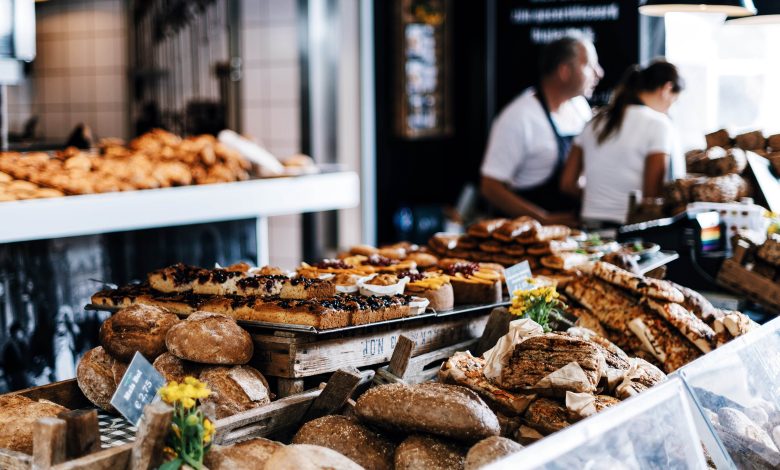Bakery business plan: how to make yours?

Have you ever heard of a business plan? Do you know what it’s for and why you should create one for your bakery? If not, it’s time to find out!
Running a business is not an easy process, and when it comes to the food industry, several factors influence the success of your business over time. First, it is essential to understand your company very well, which relates to your audience and critical points. This is where the need to have a bakery business plan comes in!
Do you want to know more about the bakery area and how to make a business plan for your bakery? So read on and find out all about it!
What types of the bakery are on the market?
Before understanding the need and benefits of a bakery business plan, it is essential to delve deeper into the bakery’s history.
If there is still the custom of eating bread, bakeries cannot say the same. The bakery began to encompass many types of establishments, with very different characteristics from each other. Are they:
Traditional bakery
As the name suggests, this is the most traditional bakery model, also called a counter bakery. The focus of this establishment is the bread and other products made on-site — such as cakes, snacks, and sweets, among others. However, it may also sell other related goods such as beverages and processed foods.
Boutique
This is a recent concept related to bakeries and refers to an establishment, usually small, that invests in exclusive products. It sells artisan bread, fine sweets, and other goods with significant added value and, most of the time, is in neighborhoods characterized by the high purchasing power of the population.
service bakery
Some bakeries invest in a wide range of products, going far beyond the traditional French bread. They also offer pizzas, soups, hot dogs, and even lunch. They usually also have a space for customers to consume these products inside the establishment.
convenience bakery
This type of bakery is located strategically to serve those customers who were consuming other products but, for convenience, take the portals to take the bread. This is the case with establishments located in gas stations, for example.
In this type of bakery, other products are also offered, such as personal hygiene items and processed and savory foods made on site.
industrial bakery
Also known as a bakery without a counter, the industrial bakery focuses on producing large amounts of bread to be consumed or sold in other establishments. They are the ones who have the industrialized bread you buy at the supermarket and can also serve companies or civil construction works, for example, providing snacks for employees in these businesses.
gourmet bakery
This is another recent concept associated with several establishments in the food sector — and bakeries are not left out. The gourmet bakery focuses on a broad food experience for its customers, valuing both the quality and the variety of products.
Therefore, in addition to the traditional bread to eat at home, they have breakfast, lunch, and even dinner service and invest in a wide range of products, including wines, fruits and vegetables, varied snacks, and much more. More. They can also count on a cafe space, all with high quality.
24-hour bakery
Faced with a world that never sleeps, 24-hour bakeries are gaining ground, especially in large cities. In addition to having fresh bread throughout the day — and at night — these establishments also usually offer services similar to a cafeteria, with coffee and snacks available to be eaten at the establishment.
The differential is the establishment’s operation, which can reach different audiences at different times of the day.
What is a business plan?
Now that you know more about the bakery market, it’s time to understand what the concept of a business plan means.
A business plan is a document that summarizes all the core elements related to your business. For example, it defines the primary mission of the company, the products, and services that are offered, the suppliers, the target audience, the maintenance cost, and the initial investment. In addition, the main risks and threats are also analyzed, as well as the company’s differentials, potential, and opportunities.
But, for the concept to be more precise, continue reading and clarify some of the significant doubts related to a company’s business plan!
What is the business plan for?
A business plan is a management tool that directs all actions and decisions related to your business. Through this document, it is also possible to identify threats and risks and, from there, create strategies to neutralize and eliminate these problems to guarantee the company’s success and longevity.
Therefore, the primary function of this tool is to provide the entrepreneur with a global view of the company, both internally and externally, to generate clarity about the best path for the business. In addition, it supports decision-making in the face of conflicts or unforeseen events. Also, it allows for the structuring of strategies that are more aligned with the company’s reality and customer demand.
When is the best time to create a business plan?
An essential element related to the business plan is the timing linked to the creation of this document. This is because this tool is usually associated with the moment of creation of the company, even before the opening of the business, as a way of structuring all the necessary elements for the new venture’s success.
However, although the business plan is essential for starting a business, allowing all initial decisions to be aligned around the same objective, it is relevant at any time in the industry. So even if your bakery is 5, 10, or even 30 years old and still doesn’t have a business plan, it can benefit from creating this document.
Is it possible to modify the business plan over time?
A company is a living organism that goes through several phases and changes. So it doesn’t make sense that the business plan is the same from creating the business to the present day.
In this way, the business plan is a document that must undergo modifications over time. Therefore, periodically, it must be reviewed and analyzed again, together with the entire team that is part of the management of the business, to adapt it to the new reality of the market.
Now that you know what a business plan is, the question remains: does a bakery business plan need? What benefits can this tool bring to this type of company?
Why create a bakery business plan?
As you can see, the business plan is a tool that allows everyone to have a global view of the company and the external environment, allowing more proactive decisions regarding the future of the business. Therefore, it is essential for any company, including bakeries!
With a bakery business plan in hand, it is possible to understand where the company’s main competitors and threats are, seeking efficient strategies to stand out in the market. In addition, you also get to know the business’s main potential and the differentials that make customers choose your bakery.
All of this supports the decision-making about the company’s future. Through You can understand the following steps to achiefollowinghe intended goals through the business plan brings some benefits to your company, such as:
- improves your knowledge about the company, market, and customers;
- allows the identification of new opportunities;
- improves the management of the bakery as a whole;
- serves as a basis for decision making;
- enhances the success of your bakery.
Therefore, a business plan is essential to ensure the success and longevity of the company. The more you know about your bakery, its strengths, and weaknesses, and all aspects of running the business, the better prepared you are to make the best decisions and overcome any obstacles that come your way.
So, read on and understand how to create a bakery business plan!
How to create a bakery business plan?
You already know that bakeries are establishments that can be very different from each other.To understand what a business plan is. You know the importance of creating one for your company. So it’s time to find out how to create a bakery business plan!
Discover our tips for defining all the elements of the business plan!
Do market analysis
Start your bakery business plan with an in-depth analysis of the external market. To do this, start with your competitors, understanding who they are, where they are located, and the differentials they offer to customers.
It is also essential to understand your customers’ immediate demands and needs here. Then, go further and draw a complete profile of consumers, including occupation, age, interests, and behavior patterns, among other elements.
Define your value proposition
It is also important to outline a value proposition for your bakery: what products and services are offered and what they effectively add to customers. This means that you must add value to your bakery products and maintain consistency. Again, all of this must be described in the company’s value proposition.
Understand who your suppliers and partners are
A bakery depends on different suppliers. These companies sell flour, yeast, industrialized products, and mixtures; among ore, you must include a list of each supplier in all segments in your business plan.
Also, include add-on options if your leading suppliers raise prices or fail to deliver on time. Also, make a list of partners for your bakery.
Calculate the cost of doing business
Another essential element for creating your bakery business plan is cost planning. This moment is necessary to guarantee the future and profitability of the business and, therefore, must be well detailed.
List all your bakery expenses, assigning value to each one.
At this point, it’s worth noting how critical it is to understand the bare minimum amount required to keep the bakery operating throughout the month. In this way, you can use this data to make decisions related to the business’s financial planning and identify ways to reduce its costs.
Understand what resources you need
You also depend on several equipment and other resources to keep your bakery up and running. This is the case with ovens, cold rooms, refrigerators, fermentation ovens, and automation systems. In addition, it also needs a minimum number of employees to serve the customers and manufacture the products.
This should include Your business plan for Laverde and the sources you need to run your bakery.
Calculate your revenue
Another essential element of your business plan is your bakery recipe. This is where you should list the primary sources of revenue for the business and their share in the company’s profits.
For example, you may find that, for instance, pão de sal is the primary source of income, with the highest share of profits, and therefore should be the most significant investment.
Map the main processes
For your bakery to work, you must have a series of processes. They include the production of each of the goods, placing orders for suppliers, customer service processes, and planning sales and cleaning of the establishment, among others.
That way, you have a complete map of everything that happens inside your bakery, improving your view of the business as a whole.
Define a communication channel with customers
You need to publicize your business and communicate with customers to attract them to the store and collect complaints and suggestions. So this is another element that should be included in your bakery business plan.
To do this, understand the communication channels used today and determine the efficiency level of each of them. Then, you can know whether you can keep what already exists or eliminate and add other channels to your bakery.
What to do after writing the business plan?
Now that you know the importance of putting together a bakery business plan and understand how to do it, it’s time to find out the next steps. After all, the business plan is a document and has no effect when kept in your company’s drawer.
Discover now some actions you can implement after writing the business plan!
Protect yourself from risks
When you create a business plan for your bakery, you can identify many risks and threats to your business. They can come from competition, changes in the country’s economic situation, and the opening of other nearby establishments.
Thus, it is possible to use this data to develop action plans that anticipate and mitigate these risks, protecting your business from potential losses.
Enhance your differential
You also better understand your company’s main differentials with the business plan. For example, what makes your customers look for your bakery and not the competition.
Based on this, it is possible to create ways to enhance this differential, publicizing it and investing in this element. With this, you boost your sales and the business’s success.
Restructure your products
The business plan makes you understand more about the market around you and the needs and desires of your customers. In addition, it gives a complete insight into the products offered by your bakery.
By comparing these two elements, you can see how well your bakery products meet consumer demands.
Create a strategic plan
Strategic planning is a tool capable of structuring, in one place, the main guidelines and objectives of your bakery, both in the short, medium, and long term. This is where you define your company’s mission, vision, and values and structure the bakery’s objectives over time.
From the business plan, you have access to a series of inputs related to your business and gain clarity when it comes to an understanding your main guidelines. With this, it is possible to structure a strategic plan and create actions to propagate it and put it into practice, both among bakery employees and customers.
Adjust as needed
Finally, it is essential to understand that the business plan is not a static document. Your bakery goes through a series of phases over time, and the market and your customers are constantly changing. That’s why it’s so important to review the business plan periodically.
Therefore, please review it and make adjustments whenever you deem necessary, according to the new situation of your business.
The bakery is a type of business that, despite being old, has undergone a series of changes in recent years, with many trends for bakeries having emerged today. As a result, new types have emerged, and the demand for innovation is constant for the market and customers.
A bakery business plan comes in as an excellent ally for your company, offering a series of benefits for the business. Now that you know how to create one take the opportunity to implement this tool in your company!
Visit here for more info




